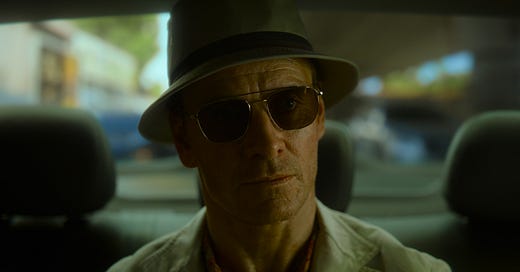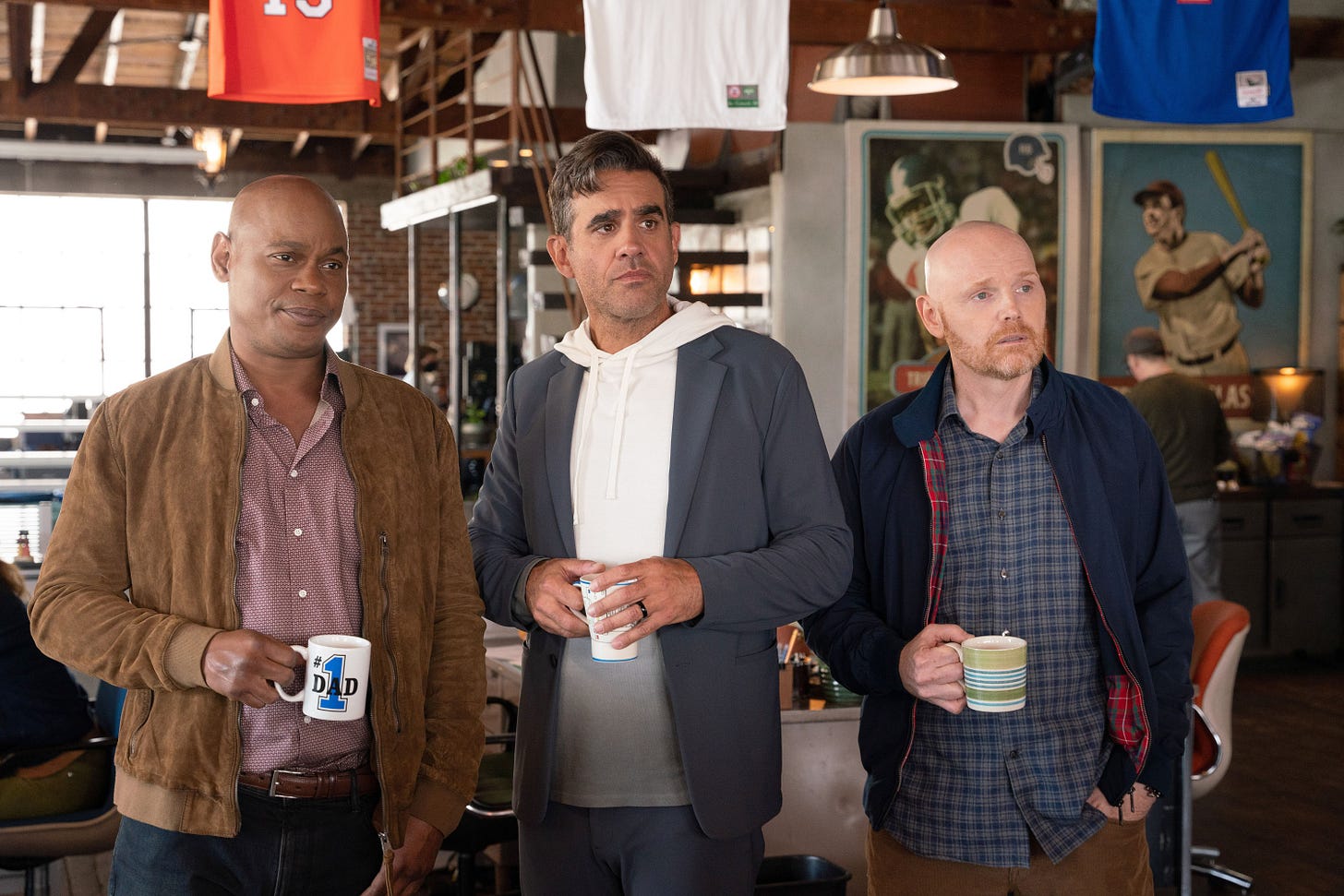The Killer Accidentally Hit the Target, Weekly Reel #62
I run the contemporary gamut this week with consumerism à la Fincher, stock market memes à la McKay rip-off, and Bill Burr raging against insecurities à la Bill Burr.
News of the Week: the SAG strike ended, which kicks off the campaign awards season and relieves Scorsese of his PR duties, once again helping save cinema while everyone has had no idea what to do. For those outside of the industry, it was a nice, calm month, especially on social media, where nothing is happening.
Watch Now
The Killer (2023, David Fincher, USA) opens in a cold, abandoned Parisian WeWork building that lasts over twenty minutes. We watch the killer (welcome-back-to-cinema Michael Fassbender, who’s been hiding out in Portugal raising a child with Alicia Vikander and casually racing for Porsche in the European Le Mans Series—not bad!) recall his training through extensive voice-over, muse about the day-to-day boredom of assassin life, pick up some McDonalds wearing German tourist chic, stretch, drink water, meticulously clean all possible traces of DNA/fingerprints, destroy a cell phone (but wouldn’t just the SIM be enough?), and basically offer a mature refute to the young-bro energy of something like Fight Club’s fuck-off nihilism. The minimal screenplay was written by Andrew Kevin Walker (Se7en) based on the French comic book by Alexis Nolent. What we know from Mank is that Fincher is working in his post-TV era of Netflix projects, so far consisting of more contemplative and self-aware political stories of the everyman/“many” up against the establishment/”few.”
To do so, in The Killer, Fincher references more popular and more modern convenience brands than usual (Amazon, DoorDash, etc.) as commentary on how this form of consumerism is complicit in the metaphorical killing of us all, which is a game controlled by those at the top. Modern-day capitalism expects the many to aspire to be one of the few. This inspires a fierce individualism setting those many against one another. But why not aspire to just be one of the many? That’s the dilemma Fincher’s killer faces as he tracks down the hit-people bought as insurance against his botched Parisian assassination. After the lengthy introduction, the killer shot the dominatrix and not the target. He makes the getaway and goes back home to the Dominican Republic, where he finds music blaring and remnants of a bloody fight. His girlfriend is in the hospital, and the film has become a standard revenge thriller.
Fincher subverts every corner of the genre, starting from the rapid-fire opening credits overlayed with action-thriller tropes, followed by a Jean-Pierre Melville speed assassination attempt. Even the motivations are flimsy, we don’t spend any pre-hospital time with the killer and his girlfriend, which sends us in medias res on a journey we’re not emotionally involved in. The score by Fincher regs Reznor/Ross is less bumpy and moody than in their twenty-tens masterpiece collaborations, while The Smiths, the killer’s favorite band to kill to, does the heavy diegetic heavy-lifting.
Whereas the antagonistic serial killers in Se7en and Zodiac rely on pre-smartphone antics to pull off their elaborate killing sprees, The Killer flips the killer into the protagonist using the comforts of modern leisure living. Do you feel safe knowing that electronic keys can be replicated via a Prime delivery? That’s what the disruption economy provided us, a more efficient way towards passive death. The killer’s story in this film is an arc towards agency, showing that the many could in fact take on the few (through violent acts, sure, but power nonetheless keeps the many down through violence regardless). And why shouldn’t he? After all, after his botched job, an honest working-man’s mistake—we’ve all been there—his superiors attempt to off him as collateral damage to save their own ass. This is self-defense in the way that How to Blow Up a Pipeline is a small group taking up the defense of the planet.
This is where we’re at (as will be somewhat repeated in the following review): the post-Occupy Wall Street, post-Bernie, post-Pandemic point at which it seems impossible for the many to do anything to get a leg up on the few. Income inequality grew during Covid faster in a shorter amount of time than at any other point in history, unemployment figures are “low,” yet everyone is displeased, and nobody feels better off. That’s why the GameStop short squeeze was a cathartic release with no real future. It exposed a kink publicly that everybody knew about privately, a way of saying “I’m as mad as hell, and I’m not going to take this anymore.”
Fincher touched upon a similar current in Mank, which is set in the nineteen-thirties with a close amount of attention paid to the 1934 California gubernatorial election between Republican Frank Merriam (the winner) and Democratic (former Socialist Party member) Upton Sinclair, one of the most important American writers and activists of the Progressive Era. In a shifty amount of anachronistic maneuvers, Merriam uses MGM, led by Chairman of the California Republican Party, Louis B. Mayer (played by Arliss Howard, who is also the big bad boss in The Killer), to craft a smear campaign using staged setups pretending to be documentary footage—much of the kind of dog whistling we still see today. Herman J. Mankiewicz, working as an MGM screenwriter at this time, plays the self-aware role of the court jester, especially at Hearst Castle, where William Randolph Hearst amuses powerful guests that he had bought off, including Mayer. But he could only joke so much. They control the media in which “issues” are mediated and how images are made. Legitimate change against oppression, through figures like Sinclair, were swatted away and haven’t been able to recover ever since. Mankiewicz used this inspiration to write the screenplay for Citizen Kane in 1940. David Fincher’s father, Jack, used this story about Mankiewicz to write the screenplay for Mank.
The connection between Mank and The Killer: while modern society has advanced technologically, the basic political rights of the many have dwindled into a cold, calculating, Fincheresque aesthetic—that he created in House of Cards and which most streaming shows rip-off. Interpersonal connections are reduced to apps, crypto is just another scheme to trap you. Fassbender is the perfect combination of that cold killer instinct while drawing you in more.
The Killer is streaming on Netflix.
Save for Later
Dumb Money (2023, Craig Gillespie, USA) unfortunately shows that we’re still not close to over the post-The Big Short era—masquerading as The Social Network—to explain either how a big company and/or a laissez-faire (ideologically) socio-economic catastrophe is affecting the normal American people. Films will fall on either side, but fall off the cliff, nonetheless. It’s rather rich that Dumb Money tries to ambitiously rip both off: it used a Ben Mezrich straight-to-script story (like The Social Network; along with a guy called Michael De Luca who has a sus Wikipedia pic) along with executive producers—and crypto-bro former Olympians played by Armie Hammer and himself, kinda—the Winklevoss Twins, while stealing the general structure and feel (vibes today) of late-stage Adam McKay liberal filmmaking ethos. Craig Gillespie, Australian director known for I, Tonya and Cruella, seems to have gotten a hold of the Gary Sanchez Productions mad-libs and spent a good amount of time browsing r/wallstreetbets for this adventure.
When will this style end? Like The Big Short, Dumb Money would have been a better documentary if not for the left-liberal, anti-establishment proselytizing that capitalism is forcing art into. It’s better to memeify the legitimate criticism and let that stand as the argumentative straw-man. The GameStop short squeeze phenomenon was a fatalistic endeavor of monetary nihilism. Holding was better to bankrupt a company trading on ‘dumb money’ and short sells. These people were already in or near the red, they knew the system (stock trading) was rigged against them and their massive amounts of debt, this was their moment. But it’s done, the house always wins, subprime mortgages are back on the menu. Who cares if it’s a different movie.
But as a film, Dumb Money works just fine. It would’ve been better without Pete Davidson—as Newton’s fifth law clearly states. Paul Dano (in The Batman), along with America Ferrera (in Barbie) to a lesser extent, are staking solid positions in the character-actor’s market of 2023 films. Dano has chosen the online video influencer route ranging in different forms of nihilism (hopeful in Dumb Money; suicidal in The Batman) while Ferrera plays a single thirty-something (sometimes with kid) working person, always frustrated with those superior to her in need of some outside help.
The Dumb Money soundtrack is hyper-modern, meaning the tracks were determined via TikTok algorithms. For instance, it begins quite loudly with Cardi B’s WAP, yum, I couldn’t help but look around at the Berlin matinée viewing public of older adults. (Cue the hearing aid removals and reliance on German subtitles from then on.) You can pretty much just read the GameStop short squeeze Wikipedia page, imagine Dano and Ferrera and Seth Rogan and Nick Offerman and WAP and Drake(?) and you’ve seen it, congrats! Just wait until this arrives on a streaming service you already pay for. But because it’s distributed by Sony, it’ll probably end up on Netflix, who has the best (most subs) platform for max viewing that will give the production companies all the money they lost on its release and marketing and whatnot. And this wasn’t even the Pass of this week, yikes.
Pass
Old Dads (2023, Bill Burr, USA) is more proof that standup comedy doesn’t translate into filmmaking. Most comics fall in the trap of wanting TV and movie deals, which undeniably makes more money (when done right) but completely dilutes the comedy inherent to what makes the comic popular. In Old Dads, Bill Burr employs many of his usual standup topics that feel wildly out of place in this context, to the point that makes one question whether they were ever funny. With the Rogan bump and other methods standup comics are using to acquire their newfound riches, it’ll only lead to more aggressively subpar comedy efforts, which we experienced several months ago with The Machine. This medium is fundamentally not the same, and it’s rare when the two have crossover success (critically, not commercially, because nobody wants another Eddie Murphy situation); Louis C.K. was perhaps the only one to pull it off before…
Thank you once again for checking out my Substack. Hit the like button and use the share button to share this across social media. And don’t forget to subscribe if you haven’t already done so.






